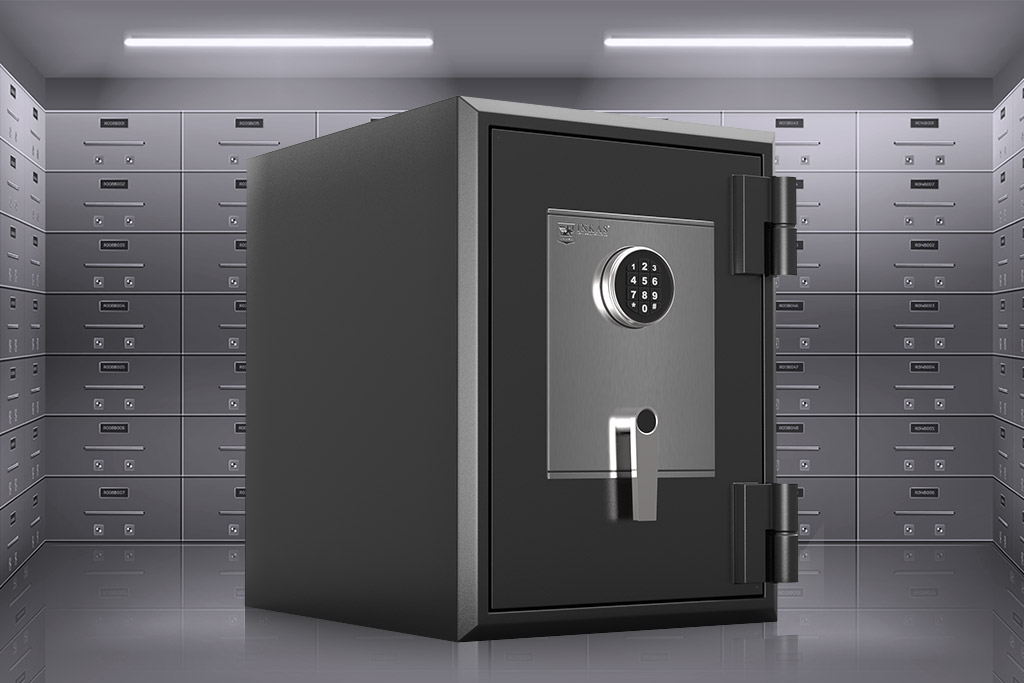
Our customers often come to us with questions about safe deposit boxes. In this article, we will help you understand what exactly a safe deposit box is, how it works, and whether it’s the right choice for you.
So, when is it beneficial to use a safe deposit box, and when is a classic safe a better option? Let’s look at some facts to help you make that decision!
What is a Safe Deposit Box
A safe deposit box is a secure storage option offered by a bank. It is a small, heavy, metal box built into the vault walls and protected with multiple layers of 24 hour security.
As the customer, you rent the safe deposit box on an annual basis to store your jewelry, heirlooms, important documents, and other valuable items.
Access to the box depends on the help of a bank employee, as it requires 2 keys to open. Some of the more advanced ones also rely on biometric access, but generally it’s just 2 keys. You have one key, and the bank holds the other. When you want to access your box, you and the bank employee must simultaneously turn your keys in order to open the door.
Technological Innovations in Safe Deposit Boxes
Advancements Shaping the Future of Secure Storage
- Biometric Security: Modern safe deposit boxes increasingly incorporate fingerprint scans, facial recognition, or iris scans for enhanced security and personalized access.
- Digital Monitoring Systems: Integration of digital surveillance within the safe deposit box system allows for real-time monitoring and alerts for any unauthorized access attempts.
- Remote Access Control: Advanced systems enable users to control access remotely, including time-restricted access features.
- Smart Connectivity: Integration with smart home systems for status updates and security alerts directly to your smartphone.
- Climate Control Technologies: Some high-end safe deposit boxes now offer climate control features to protect sensitive items from environmental damage.
How Much Does a Safe Deposit Box Cost?
The price of using a safe deposit box varies by area and bank. They charge a yearly fee for it, but many banks offer rebates or discounts if you keep a minimum amount of money in your account or hold other assets at their location (an investment account, for example). Rates normally vary from $60-$150 per year.
3 Benefits of Using Safe Deposit Box
- Safe deposit boxes are made with high quality steel and can withstand almost any potential damage, including water and fire. They are not completely tamper proof however, as some unfortunate bank robberies have proven.
- Having your items stored in a location separate from your home can provide peace of mind if you live in an area that is known for burglaries, or if you have other personal reasons for not wanting valuable items kept in your home.
- Safe deposit boxes are kept behind multiple layers of 24 hour security for better protection against break-ins. This can be very reassuring, especially if you don’t need to access your items often.
Are Your Valuables Insured Inside a Safe Deposit Box at the Bank?
Most of us are led to believe that a safe deposit box at a bank is the safest way to store valuables. Unfortunately, that’s not always the case.
There is no government issued insurance for the contents of a safe deposit box. Individual banks may offer protection or even insurance at an additional fee, but you may find that the assurances they give you in person are quite different from the safety measures they include for their own protection in the paperwork you sign to rent a box.
To ensure the contents of your safe deposit box are covered, you are best to purchase it through your homeowners or renters insurance.
Safe Deposit Box vs Conventional Home Safe (comparison)
We’ve discussed the benefits of safe deposit boxes in this article, but they are not always the best choice when it comes to keeping your valuables safe.
For as secure as the bank assures you the safe deposit box is, mistakes can be made. There have been quite a few instances where the bank themselves will mix up two boxes, giving the wrong one to a customer and as a result, having valuable items lost forever.
If the bank were to ever get robbed, the contents of your safe deposit box are at risk of going missing as well, and unless you purchased separate insurance, they will likely not be covered.
One more significant thing to note is that in recent years, the use of safe deposit boxes has been steadily declining. Some banks are even phasing out their use because they have sat empty for so long.
Why is this happening? There are a few reasons, but a big one is that the quality of home security options has gone up and has become more affordable.
When it comes to security, home safes can offer unprecedented protection against almost any attack. For example, our UL-TL30x6 High Security Safe features an
advanced composite wall structure, solid steel deadbolts, a bulletproof steel plate, and other innovative security features to keep your valuables safe. These, as well as its anchoring bolts, protect it from power tools, fire, or being carried off in a burglary.
The main reason our customers choose a home safe is that they are easily accessible while still offering high levels of security. This means that you can keep items such as passports, medical records, or insurance papers safe, and don’t have to go through the complicated process of accessing a safe deposit box when you need them.
Comparative Analysis: Safe Deposit Boxes vs. Home Safes
Deciding Between Safe Deposit Boxes and Home Safes: A Guide for Different Needs
- Security Level:
- Safe Deposit Boxes: Typically offer higher security, being located in bank vaults with advanced surveillance and alarm systems.
- Home Safes: Security level varies based on model and installation quality.
- Accessibility:
- Safe Deposit Boxes: Access is limited to bank hours and requires travel to the bank.
- Home Safes: Available 24/7 at your convenience.
- Size and Capacity:
- Safe Deposit Boxes: Limited to the size offered by the bank.
- Home Safes: Available in various sizes to accommodate different needs.
- Cost:
- Safe Deposit Boxes: Recurring rental fees.
- Home Safes: One-time purchase cost, potentially higher for advanced models.
- Protection from Natural Disasters:
- Safe Deposit Boxes: Generally offer better protection against floods, fires, and other natural disasters.
- Home Safes: Depend on the specific model’s fire and water-resistant ratings.
Ideal Usage Scenarios
| Scenario | Safe Deposit Box | Home Safe |
|---|---|---|
| Important documents | ✅ | ❌ |
| High-value items (jewelry, collectibles) | ✅ | Depending on security level |
| Frequently accessed items (passports, small valuables) | ❌ | ✅ |
| Large items or collections | ❌ | ✅ (if size permits) |
So When Should I Use a Safe Deposit Box & When Classic Safe is Better?
Safe Deposit Box:
A safe deposit box may be a good option if you have valuable or sensitive items that you don’t need to access very often. If you decide to do this, we suggest not keeping the original or only copy of documents in the safe deposit box. It’s better to make a copy and keep the originals in a secure home safe. This way, the safe deposit box is used more as a backup and not the sole place of protection for your items.
Home Safe:
If you want to be able to access your valuables more frequently, or want to keep them close at hand in case of an emergency, a home safe is the better option. When you purchase your home safe from a reputable supplier like Inkas Safes, you can be assured that you are getting the highest level of security measures available.
Our top priority at Inkas Safes is keeping your valuables secure and protected. If you still have questions about which storage option is right for you, you are invited to ask them. Our safe experts will answer all of your questions and provide unbiased guidance so that you can make the decision that is best for your situation. They are available on the phone, by email or chat, contact us anytime!

